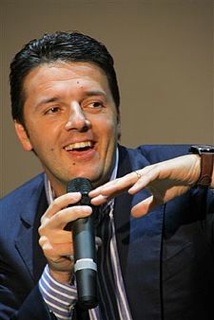
The Italian left, heirs to the strongest communist party in Western Europe and a powerful Catholic political tradition, is struggling to adjust its values and political agenda to the new needs and constrains of the modern globalised world. As the Democratic Party seems set to win Italy’s general elections next year, and thus take control of the third largest economy of the Eurozone, such ideological adjustment is now particularly urgent. After a first failed attempt at modernisation in 2007, the campaign of Matteo Renzi in the recent primary elections might have indicated a way forward.
The fly and the mule
Michele Salvati, an Italian economist, politician and intellectual, is generally considered the father of the Italian Democratic Party. He was the one who, as early as 2003, proposed the creation of a new reformist party which could finally reunite the different political traditions of the Italian centre-left: the former communists, the Christian democrats and the liberals. While the former communists and Christian democrats could provide the new party with their solid organisational structures and their vast electoral support, the liberals should have taken, in Salvati’s view, the intellectual leadership of the party. Their modern and articulated political program would have replaced the outdated cold war ideologies that had until then dominated the Italian left. Significantly, Salvati’s manifesto was titled “The Democratic Party for the liberal revolution”.
For a brief and exciting moment, Salvati’s (and others’) project seemed to be working. The first leader of the new Party, Walter Veltroni, embraced the liberal agenda in a powerful speech given in Turin in June 2007 and, on the basis of that political platform, engaged Silvio Berlusconi in the 2008 electoral campaign. With the usual few years of delay, the Italian left seemed on the path to modernize its political discourse along the lines already taken by New Labour in Britain or the Social Democrat’s Agenda 2010 in Germany.
The defeat of Mr Veltroni in the April elections of 2008 marked, however, the end of this first liberal experiment. In the following years, it become increasingly clear that the real leadership of the Party lay not with the few liberal intellectuals who had fought over the manifesto of 2007, but rather in the hands of the former communists and Christian democrats who had, strategically, devoted their attention to control of the Party’s apparatus and bureaucratic machine. As a result, Italian liberals suddenly found themselves in the position of Phaedrus’s fly who, sitting on the neck of the mule, is convinced he is leading the chariot when he is in fact only a rather unimportant passenger:
“How slow you are,” said the fly rebuking the Mule “will you not go faster? Take care that I don’t prick your neck with my sting.” The Mule made answer: “I am not moved by your words, but I fear him who, sitting on the next seat, guides my yoke.”
What went wrong in 2007
In retrospect, we could argue that the liberal’s attempt to take over the Italian left was flawed for two distinct but related reasons.
Their first mistake was overestimating the power of ideas and underestimating the power of bureaucracies. The liberals’ strategy was wholly based on the production of sophisticated ideological manifestos and ignored, almost completely, the need to gain control of the Party machine.
The second mistake was that of underestimating the resilience of the old ideologies. While defeated by history in the Cold War, the Italian Communist Party had emerged as somewhat victorious from the struggles of the Italian First Republic, and was not ready to declare its ideological bankruptcy or to accept the liberals’ “friendly takeover”. Furthermore, in a conservative and corporatist society like Italy, any attempt to resist a “liberal revolution” easily found many powerful allies.
Matteo Renzi’s revolution
While in the last few years the Democratic Party seemed to be inexorably sliding towards becoming simply a new branding for the old habits and taboo of the Italian left, a new unexpected hope finally came from the young Mayor of Florence, Matteo Renzi.

Mr Renzi rose to national attention by calling for the “rottamazione” (forced retirement) of the old Party leadership, which he deemed at least partially responsible of the sorry state of the country. He then went on challenging the party’s leader, Pierluigi Bersani, in a hotly contested primary election for the premiership. Whether by genuine conviction or for the strategic purpose of filling a political vacuum, during the campaign, Renzi emerged as the new champion of the Party’s liberal platform, notably by endorsing its proposals for the liberalization of the labour market.
While not completely convincing for several reasons (chiefly his penchant for populism and sometimes excessive attention to image and communication), Renzi seemed to have understood the early mistakes of left wing liberals. He understood that politics is about winning elections, not debates, and that an ideological renewal will necessarily need the rejuvenation of political personnel. Instead of hoping to use old parties to promote new ideas, in the way Salvati and the 2007 intellectuals had, Renzi is using new ideas to defeat the old Party leadership.
Of course, just as Veltroni in 2008 against Berlusconi, Renzi lost his battle against Bersani. By engaging in a real fight for the Party leadership however, Renzi has taught an important lesson to all the Party’s liberals. Socialists and Catholics will not graciously hand over control of the party to them: they will have to fight for it. If the Democratic Party is to lead a liberal revolution inside Italy, there first needs to be a liberal revolution inside the Democratic Party.
Rocco Polin is a PhD student at the University of Florence. He holds a visiting studentship at the POLIS department at the University of Cambridge.






No Comment